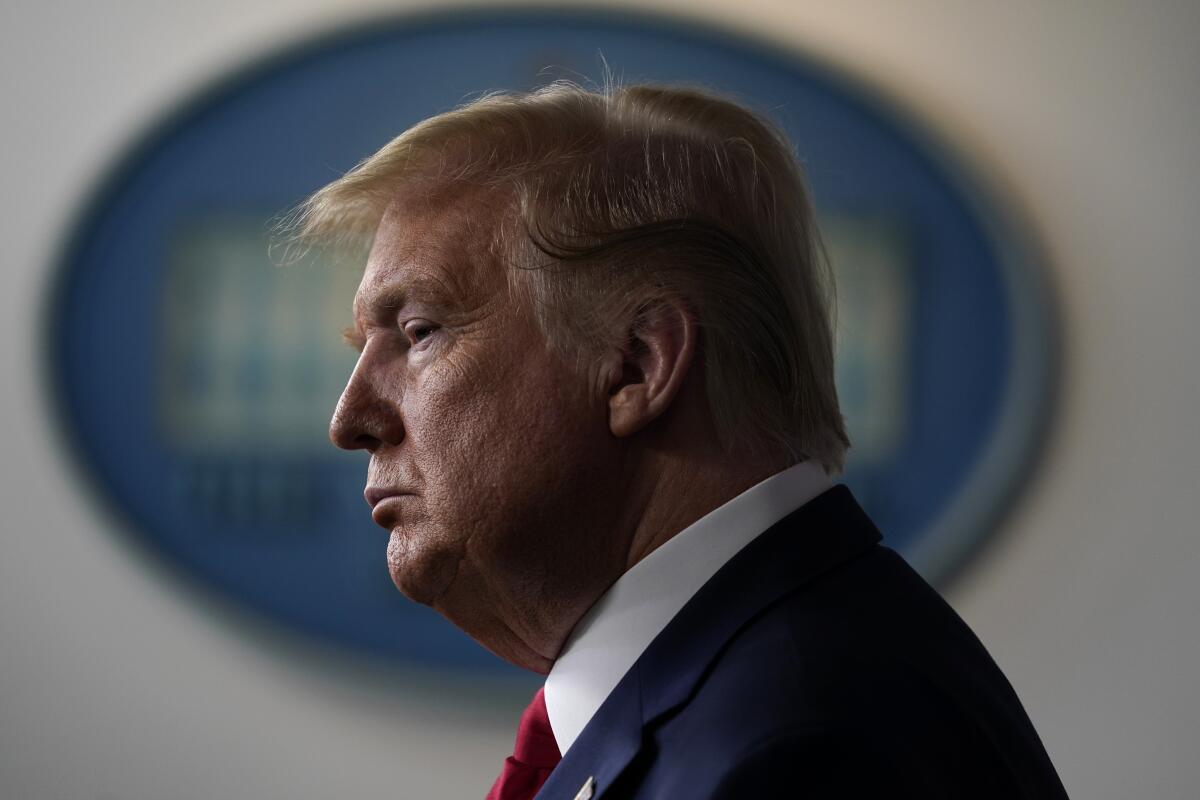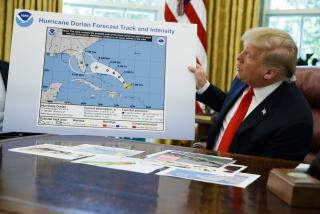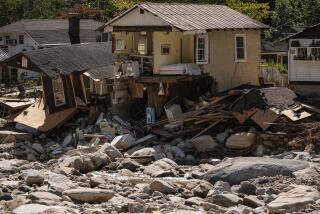Column: Is COVID-19 Donald Trump’s Hurricane Katrina?

- Share via
When Hurricane Katrina smashed the Gulf Coast on the morning of Aug. 29, 2005, President George W. Bush was kicking back at his Texas ranch. He’d managed to ignore the news.
The evacuation of New Orleans. The mounting death toll. The desperation on rooftops, where people shrieked as the water rose.
Bush was a low-information president, but he could, with effort, metabolize bad news. When an aide finally presented a lively video montage of the tragedy, Bush headed back to Washington, staging an airborne photo op: the president looking out a window during an Air Force One flyover of the disaster area. He may have hoped to look like a shrewd general on a tactical mission. Instead, he seemed clueless and detached.
His popularity tanked. “He never recovered from Katrina,” said one of his former advisors.
President Trump, in his erratic efforts to manage the COVID-19 crisis, likewise has been squirrelly, scatterbrained and late. His approval rating, falling a bit since mid-February, bumped up a touch Wednesday, but nearly every election poll has former Vice President Joe Biden, now the presumptive Democratic nominee, beating him soundly in November’s presidential election.
It’s a fool’s game to call anything Trump’s Waterloo. But this virus might be his Katrina.
As we now know, had Trump posed less and strategized more, he might have helped the U.S. better contain the virus, save lives and forestall vicious damage to the global economy. But for weeks he dithered. In public, he lied, spoke in unsettling logic loops, flagrantly violated even the good-hygiene practices he advocated and lashed out at his usual phantoms for inconveniencing him with the disease.
Instead of coming up with a cohesive approach to sophisticated leadership in a plague year, Trump, along with his valets and his news agency Fox, went about devising a Trump alibi. Coronavirus, they were saying as recently as two weeks ago, was largely an invention of the media and Democrats.
Democrats think the virus will be “what brings down the president,” said Mick Mulvaney, Trump’s former acting chief of staff. Trish Regan, of Fox Business, called the virus “yet another attempt to impeach the president.”
According to the New York Times, Trump took advice from his son-in-law, Jared Kushner, who told him the media was exaggerating the threat posed by the virus, and that he ought to weather the epidemic as a personal PR crisis. (Kushner told the Saudi crown prince, Mohammad bin Salman, something similar soon after it was discovered the prince ordered the barbaric dismemberment of a journalist.)
The coronavirus might be novel, in other words, but Trumpworld’s response is not.
The president has long displayed something worse than indifference when confronted with the suffering of others: contempt. He sneered at the late Sen. John McCain’s captivity in Hanoi during the Vietnam War. He called Hurricane Maria, which led to the deaths of more than 3,000 in Puerto Rico in 2017, “not a real catastrophe.” In 2018, he praised the “very fine people”— white supremacists — who marched in Charlottesville, Va., one of whom murdered activist Heather Heyer with his car.
The self-styled counterpuncher and his crew killed a lot of time, and maybe some people, windmilling around, seeking a target, broadcasting nasty tweets, spreading nonsense about how brilliant Trump is at “this stuff.”
But this week, having failed to act in the crucial early days, Trump at last seemed to face reality. He is now trying to muster resolve and clarity. Squaring his jaw, aiming for full sentences, configuring his features into “solemnity.” He is also moving on plans to showcase his newfound magnanimity with money from the U.S. Treasury.
But as with climate disasters, pandemics and markets, timing is everything. To watch the commander in chief, whatever his peacetime politics and disposition, vacillate and shadowbox when he needs to show alacrity and purpose, is radically destabilizing. If Trump’s missteps don’t cost him the short-term approval of his base, they will surely erode his reputation over the long run, just as Katrina did Bush’s.
Alternatively, should the outbreak curve flatten and the death toll come in below worst-case scenarios, Trump may try to claim he alone vanquished the pandemic. But we will no doubt be reminded of his grave and consequential failures in campaign ad after campaign ad. In the meantime, combat-tested Biden announced a cogent and thorough response to COVID-19 last week, while Trump was thrashing around.
Dan P. McAdams, in a new book, “The Strange Case of Donald J. Trump,” argues that the president holds onto his base because “bad news can’t quite pierce the Trumpist bubble.” But COVID-19 has unprecedented piercing powers. Its ravages can be felt and seen. Along with stats on the ever-mounting death toll, videos of people suffering from the disease are surfacing. Patients lucky enough to get ventilators and pain medicine are nonetheless in agony. To suffocate is a terrible way to die.
Bush never recovered his popular standing after Katrina. After the straits Trump has put this country in, his reputation should permanently tank too. After all, we are all living close to the bone now. Far too many of us will, literally, never recover from the pandemic he did so little to mitigate.
More to Read
A cure for the common opinion
Get thought-provoking perspectives with our weekly newsletter.
You may occasionally receive promotional content from the Los Angeles Times.









